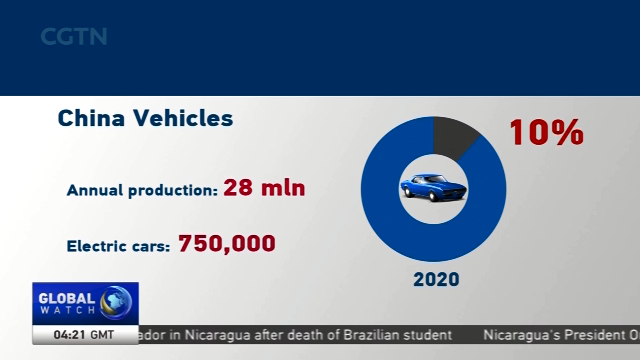
14:22, 25-Jul-2018
Building BRICS: China-India cooperation in electric vehicles flourishing
Updated
13:51, 28-Jul-2018
04:29

Another BRICS member, India, is one of China's major trading partners. More and more innovative businesses from both countries are collaborating and sharing their breakthroughs to add greater value to their products. One area where this is highly evident is in the production of electric cars. And, as CGTN's Shweta Bajaj reports, it's a perfect example of BRICS nations benefitting from each other's strengths.
Over the last 25 years, Tata Technologies has helped both blue chips and start-ups succeed. Now, it's focusing on the electric vehicle market.
Three years back, the company ventured into China, setting up its headquarters in Shanghai.
SHWETA BAJAJ INDIA "Both China and India have used technological innovations to better performance of companies in their domestic markets. What Tata Technologies has done is taken their expertise in Indian market to similar companies in China's market. They saw a huge potential in China's electric vehicle market, a sector that is likely to see a massive growth in the coming few years."
The company was building intellectual property that would be perfect for similar firms in China.
ANAND BHADE PRESIDENT, APAC SALES & MARCOM, TATA TECHNOLOGIES "From quantitative indicators, China is the largest growing economy, it's the largest consumer market for the automotive side of things. It's the largest automobile market with 28 million vehicles. So there were these quantitative indicators that clearly was saying that we need to be there but more importantly from the disruption part of it we saw a chance for us to not only contribute but learn from China."
China currently produces 28 million vehicles a year. Only 750-thousand of those run on electricity. The government wants electric car production moved to the fast lane, to account for 10 percent of the total by 2020.
Tata Technologies' first foray into China was with NIO China – a new generation electric car company. The collaboration led to the company's first electric all-aluminum vehicle – The ES8, which was launched at the end of 2017.
ANAND BHADE PRESIDENT, APAC SALES & MARCOM, TATA TECHNOLOGIES "In 2017 in Beijing, there was a clear acknowledgment by the management that without Tata technologies, the journey would have to be very difficult. So that's a very important problem. Our first full SUV using that IP actually produced a car which is in the light index of German. And something we did in record breaking time of within 30 months. So that was our first reform in the market. Very greatly with the success we had, we then had seen an EV revolution happening within the China market."
The partnership works both ways. Narendra Modi's government has an ambitious plan for a renewable energy revolution. Moving to electric cars is central to that plan and start-ups in India are not letting the opportunity go. Meet Dr. Rushen Chahal. He is the founder of Hriman Motors. The car company is planning to sell the most affordable electric car in the Indian market in the next few months. Work is in full swing for the 2-seater called the RT90.
DR. RUSHEN CHAHAL FOUNDER, HRIMAN MOTORS "Any car that you build for India is good for the entire world. If you can do it here, you can literally sell the car anywhere. Now vice versa, all the cars that are made outside of India which are electric, being brought to India will not work. You will have to do major engineering changes."
The car will have a lithium titanium battery that's optimized for India's sweltering heat. It's made in China and will be key to the car's health. It will also help keep costs down. It's a partnership that benefits both countries.
India is expected to become the world's third-largest car market by 2020. Demand is expected to rise in the nation of 1-point-2 billion people. The electric car market is also seen growing at a breakneck speed in China. While Chinese companies are taking advantage of Indian technology, India is benefiting from China's manufacturing heft.
Reporting from Pune & Delhi, in India. Shweta Bajaj, CGTN.

SITEMAP
Copyright © 2018 CGTN. Beijing ICP prepared NO.16065310-3
Copyright © 2018 CGTN. Beijing ICP prepared NO.16065310-3